Eliza Wick is a recent graduate of the University of Pittsburgh with a major in the History of Art and Architecture and a minor in Museum Studies. She originally attended the University of Kentucky, but changed majors in the middle of her time there and other factors led her to transfer to Pitt. Eliza recently completed the London Field Studies Program with the Office of Undergraduate Research and Study Abroad and she is currently an Andrew W. Mellon Foundation Fellow at the Carnegie Museum of Natural History.
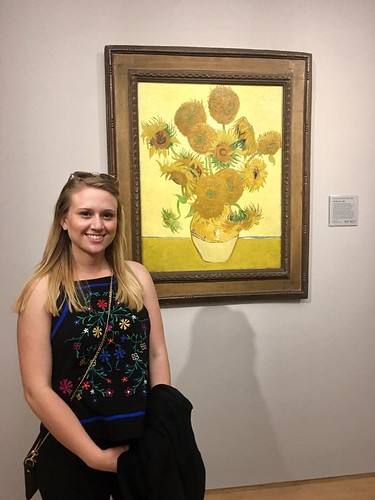
What motivated your decision to go abroad? How/why did you choose where to go?
I had always wanted to desperately go abroad for a lot of the same reasons that others want to go. I wanted to explore Europe with all of its museums, architecture, art, food, etc., but I never really looked into programs because I knew I could not afford it. That changed, though when I heard my friend Abigail talking about an informational meeting for the London Field Studies Program and she had explained that if your research proposal is accepted they pay for your trip to London. I was in awe. I could not believe that I could do research, which I love, and get to go to London for free. It was a no brainer, so I obviously applied thinking that it could not hurt, yet I did not get my hopes up that I would get accepted, but I did end up getting accepted and I immediately jumped on the opportunity. It was a lot of work, but it was so worth it and very enjoyable. I got to see many things that I had always dreamed of, but because it was an educational trip as well, I saw London through the critical eyes of a researcher, and that made it more beneficial and enjoyable than doing so as a tourist would have been.
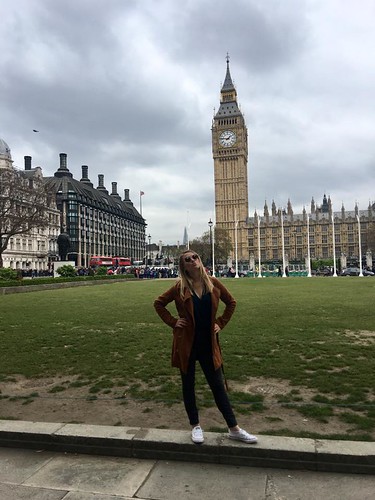
What was your experience like? What is your favorite memory? What were some challenges you observed?
It was a unique experience and probably one that many other study abroad students did not have, due to the nature of my program being so heavily research focused. Everything I did on my own and with the group was with my research goggles on. Even sightseeing was experienced with the idea that it could all somehow relate back to my research project and this was amazing because it made me see the city with more attention to detail.
My favorite memory was when I went to visit Kew Gardens by myself for my research and I had to navigate the city and underground or “tube” by myself. I messed up the directions a few times and ended up taking the wrong tube line a few times, but instead of getting frustrated like I usually would have if I were home and trying to get somewhere, I actually was overcome with happiness and excitement that I was getting lost in THE London. I rode around listening to my iPod and feeling like a Londoner and finally made it to Kew Gardens and it was a huge and beautiful oasis away from the concrete jungle of the city and I even found some really relevant research.
While my favorite thing was navigating a foreign city on my own, navigating around also was one of the greatest challenges. I remember the first or second day we were there, the entire group was going out to get dinner and we were new to using the underground and extremely jetlagged. We entered a station to use the tube and I looked away for a second and couldn’t see anyone in my group. I didn’t panic because I saw steps ahead of me and figured they went down there. Long story short, they did not go down those stairs because they were nowhere to be found when I got to the train. It was a weird feeling because even though my phone worked to text people there was a). no service down there and b). most everyone else’s phones were not even set up to text out of the country, so I was freaking out a little. I had to find people without my phone-what a 21st century nightmare! I quickly thought to go back up the stairs to the entry of the station and eventually found one of my group leaders, but that could have been a scary situation.
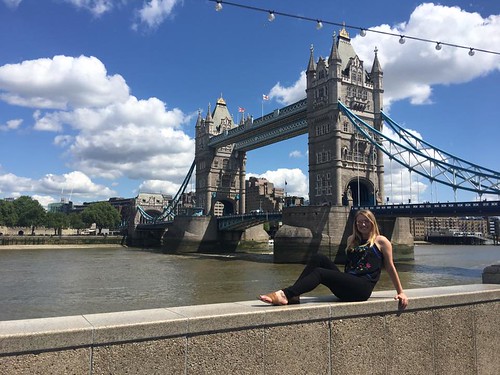
What skills did you develop from your experience? Do you feel changed from your experience abroad?
Research-wise, I learned how to research on the fly or to be very flexible, because often it can be hard to get to a certain place or what you read about a location online is different from how it actually operates, such as its open hours. I also learned to find similarities among seemingly different things, whether it be different topics I came across in my research or finding similarities between my research and a fellow peer’s that on the surface seem completely unrelated.
In a cultural sense, I also learned to see similarities among culture, customs, mannerisms, and people that seem different on the surface, but it was also interesting to see these surface level differences. My roommate and I both love fashion, and British people dress differently from Americans. We noticed that British fashion is more conservative and more gender neutral; women tend not to wear revealing things and a lot of what they wear resembles more “boyish” trends. Therefore, people almost immediately knew we were American by what we were wearing if they didn’t hear us speak or try to use foreign currency yet. We also noticed that most people walk on the left side of the sidewalk, which as well was really hard to get used to and resulted in some awkward running into people. Once it was discovered we were Americans, we were also expected to be experts on American politics and the recent election of President Trump, which became very awkward and difficult to represent your entire country’s choices as one person. It was also wonderful and new to me to see so many different cultures and people existing in one place and treating each other with respect. Overall, I gained empathy and patience for foreigners in general or people that might be new to a place or language, etc., because I experienced what it was like - and it makes me look at foreigners and refugees to the United States with a more worldly and caring outlook. It seems like America really needs to look to London as an example for how to have multiple cultures, ethnicities, and religions truly coexist because they are able to do it and they have even less space than we do.
Has your experience helped you get to where you are today?
People are always fascinated by this section of my resume because it is such a unique program. They are always curious how I found it and was accepted, as well as what the experience was like and how I managed to get my travel abroad almost completely paid for. It is always a good conversation starter in interviews and it gives me a chance to talk about what I loved while showcasing my experience and skills.
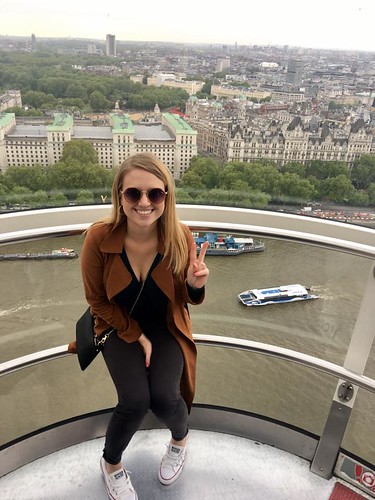
What advice would you share with other students who are thinking of going abroad?
For students like myself, whom do not have the money to pay for a more traditional study-abroad program, do not let the issue of money stop you from searching for opportunities. The Office of Undergraduate Research offers two amazing programs that are paid for by the university! They have the London Field Studies Program and the New York Field Studies Program, both of which are amazing opportunities to travel for free, complete independent research related to your area of study, and make strong connections with fellow researchers that come from a variety of academic areas.
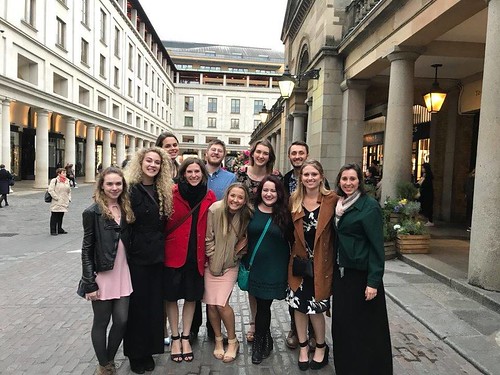
How has international education impacted or influenced your cultural identity?
Traveling to London and actually walking around the city and interacting with other people made me realize how narrow and specific my experience, upbringing, and self are compared to the rest of the world. It made me realize the harsh truth that most people do not have as much as I have, and have not been as fortunate as myself as well as have had completely different lives than me. However, it was wonderful to realize that there are similarities among all people. One simple thing being that everyone really loves to laugh and we all find similar things humorous. Additionally, for the first time in my life, I felt like a minority and felt judgment for who I was in certain places - that was really eye-opening because not everyone likes Americans and I felt the frustration of what comes with people judging you without knowing you. Meeting other Americans in London was also very cool and even if they were from say Ohio or California, you felt instantly connected to them in a way that you wouldn’t have if you met them in the United States. I also loved hearing so many languages spoken at once and not being able to identify most of them—that really made me realize how narrow a perspective I have and that I need to make a conscious effort to broaden that moving forward.
Is there anything else you'd like to share with us?
Remember that just because you don’t have a lot of money to study abroad does not mean you cannot go!
Pin for later:
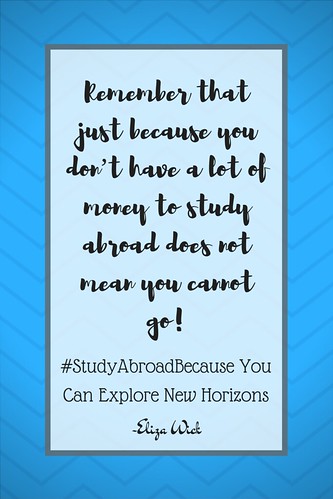
#StudyAbroadBecause You Can Explore New Horizons!
Stasia Lopez is the Global Education Editor for Wandering Educators and is also a Career Consultant at the University of Pittsburgh. She graduated with her Master’s degree in Educational Leadership in Higher Education and Student Affairs from Western Michigan University and earned her Bachelor of Science in Business Administration degree in Hospitality and Tourism Management from Robert Morris University. Stasia is passionate about international education, travel, and loves working on a college campus. She’s lived in four different U.S. states (Florida, Michigan, South Carolina, and Pennsylvania) and also studied and lived abroad in Rome, Italy. Stasia lives in the Pittsburgh area with her husband, Fernando, precious daughter, Maya, and playful kitty-cat Zorro.
You can read more of her #studyabroadbecause interviews, as well as articles on various forms of international education at home and abroad, here.
All photos courtesy and copyright Eliza Wick
